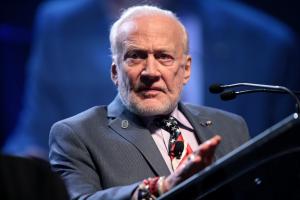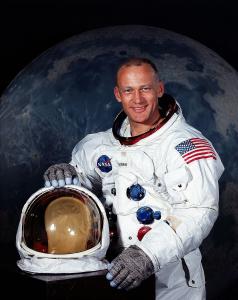
NATIONAL SPACE SOCIETY APPLAUDS BUZZ ALDRIN'S HONORARY PROMOTION TO BRIGADIER GENERAL
NSS Board of Governors Member Has a Long History of Service in Space Advocacy
“Buzz Aldrin is both an American hero and a national treasure," said Karlton Johnson, Chairman of the NSS's Board of Governors and a retired Air Force colonel. "Being on our country’s first team to set foot on the moon, his legacy is a clarion call for humanity’s ultimate expansion and settlement of the solar system. As a fellow airman, I salute his accomplishments and this overdue promotion, and on behalf of the NSS Board of Governors, we are so very proud to have Buzz amongst this august team! Well done, Buzz!”
Dr. Aldrin, who retired from the Air Force as a colonel, graduated from West Point in 1951 with a degree in mechanical engineering and entered active service with the U.S. Air Force in 1952. He flew 66 combat missions, shooting down two enemy fighters in the Korean Conflict. He later served in Germany, leaving active service in 1959.
Upon leaving the Air Force, Aldrin enrolled at the Massachusetts Institute of Technology (MIT), graduating with a doctorate in astronautics. His dissertation focused on crewed orbital rendezvous, and his theory would be put into practice in just a few years during the flight of Gemini 12.
Dr. Aldrin was selected as a NASA astronaut in 1963—the first astronaut with a doctorate degree—and he flew his first space mission, Gemini 12, in 1966. During that mission he completed a manual rendezvous when the spacecraft computer failed, using only a sextant and slide rule, and completed the first completely successful Extra Vehicular Activity (EVA) of the Gemini program, a step considered critical for moving ahead with the Apollo lunar landing missions.
For the next few years, he served on backup crews for Apollo missions until July 16, 1969, when he launched aboard Apollo 11 with crewmates Neil Armstrong and Michael Collins, serving as the Lunar Module Pilot for that mission. Armstrong and Aldrin landed on the moon on July 20, performing the first sortie on its surface in history.
"Buzz Aldrin's keen scientific mind—one of the most brilliant I've ever had the pleasure to interact with—was critical to the success of both the Gemini and Apollo missions," said Rod Pyle, the Editor-in-Chief of the NSS's Ad Astra magazine and an author of numerous spaceflight histories, including 2019's "First On the Moon," co-published by the NSS. "On his Gemini 12 flight, Buzz was the first to succeed in meeting all objectives of his EVA due to his extensive preparation in an underwater simulator, a technique which he helped to pioneer. On Apollo 11, his characterization of moving on the lunar surface in the bulky Apollo EVA suit helped NASA to refine future lunar surface exploration techniques. It's fair to say that without Buzz's contributions, the early Apollo missions would not have gone as smoothly."
Dr. Aldrin has received the Presidential Medal of Freedom, the Air Force Distinguished Service Medal, the Legion of Merit, two Distinguished Flying Crosses, three Air Medals, and countless other awards from across the world. In 2011, the Apollo 11 crew received the Congressional Gold Medal. In Feb 2019, Aldrin was honored at The State of The Union Address with a standing ovation.
Dr. Aldrin has been a staunch supporter of STEM education for decades, authoring and co-authoring over a dozen books, including children's educational titles with NSS member Marianne Dyson. His various educational foundations have benefitted schools nationwide, and Aldrin has been a strong proponent of international unity in space exploration. Dr. Aldrin has also been a prominent media figure for decades, appearing as himself on numerous T.V. shows.
The National Space Society was founded in 1987 via a merger of the National Space Institute and the L5 Society. The NSS is the preeminent citizen's voice on space exploration, development, and settlement. To learn more about the NSS and its mission to establish humanity as a spacefaring species, visit us on the web at space.nss.org.
Dale Skran
National Space Society
+1 908-610-3615
email us here
Visit us on social media:
Facebook
Twitter
YouTube
Distribution channels: Aviation & Aerospace Industry, Culture, Society & Lifestyle, Science, Technology, World & Regional
Legal Disclaimer:
EIN Presswire provides this news content "as is" without warranty of any kind. We do not accept any responsibility or liability for the accuracy, content, images, videos, licenses, completeness, legality, or reliability of the information contained in this article. If you have any complaints or copyright issues related to this article, kindly contact the author above.
Submit your press release


